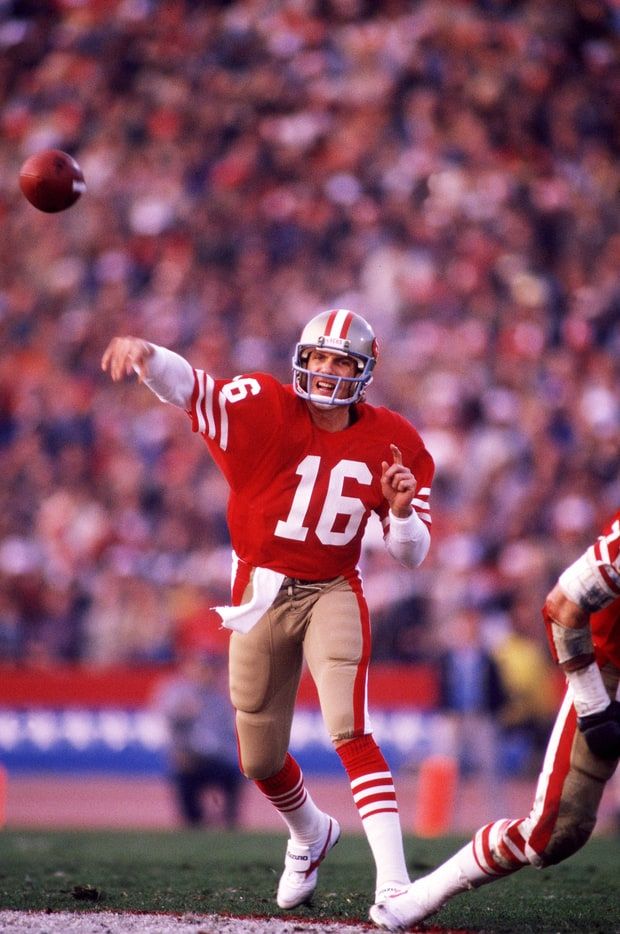Player Introduction:
As the quarterback and leader of his teams, Montana was known for his strong leadership qualities. He could inspire and motivate his teammates, earning their respect and trust. His leadership played a significant role in the success of the San Francisco 49ers during the 1980s. Joe Montana attended the University of Notre Dame, where he played College Football and led the Fighting Irish to a National Championship in 1977. Joe quickly became the 49er’s starting quarterback leading the team to four Super Bowl Victories in the 1980s winning Super Bowl’s XVI, XIX, XXIII, and XXIV. He is known for his precision passing, calm attitude, and his ability to perform under pressure, giving him the nickname “Joe Cool.” The former quarterback would be later inducted into the Hall of Fame in 2000. He was selected to eight Pro Bowls, winning two NFL MVP Awards, and three Super Bowl MVP Awards. Because of this, Joe Montana is the only player in NFL History to have won these Super Bowl Rings four times.
In college, he made the all-American team. Despite Montana’s early success, he was not selected until the third round of the 1979 NFL Draft at pick 82. However, this turned out to be one of the greatest steals in NFL Draft History. Throughout the 1980s, the starting quarterback consistently demonstrated his excellence in passing, decision-making, and leadership on the field. Montana was known for his accuracy as a passer. His ability to read defenses, make quick decisions, and deliver precise throws to his receivers set him apart as one of the premier quarterbacks of his era. He also maintained a high level of performance during regular-season games and his play elevated in crucial moments, most notably during the postseason.
“The Catch” and Beyond:
The 49ers, under Montana’s leadership, had one of the most dynamic and successful offenses in the league. He formed a legendary connection with hall of fame wide receiver Jerry Rice, which contributed significantly to the team’s success. The two players connected for numerous touchdowns and were instrumental in the success of the 49ers during that era. The iconic touchdown pass to Dwight Clark in the 1981 NFC Championship Game— epitomized Montana’s connection with high-stakes moments. His synergy with teammates, particularly wide receiver Jerry Rice, reshaped the landscape of offensive prowess in the NFL. No. 16 represented not just a quarterback’s jersey, but a symbol of camaraderie and success.
Injuries and Resilience:
Montana’s journey was not without challenges, he had injuries, including back surgery in 1986 and an elbow injury in 1991. Yet, his ability to overcome physical setbacks showcased a determination that complemented his on-field finesse. After missing almost the entire 1991 season due to an elbow injury, Montana returned to play for the San Francisco 49ers in 1992 and won the NFL Comeback Player of the Year Award. His three Super Bowl MVP awards attest not only to his statistical contributions, but also to his ability to rise to the occasion on the grandest stage.
Precision and Composure:
Montana’s ability to execute precise passes with unyielding composure became the content of legend. To close his career, Joe Montana had an unofficial retirement ceremony at Candlestick Park in 1997, where he signed a one-day contract with the San Francisco 49ers to retire as a member of the team. After retiring from football, Montana ventured into business. He has been involved in various business enterprises, including a successful career in sports commentary and ownership stakes in businesses. Montana wore 16 throughout his NFL career, and it became iconic in association with his name. The San Francisco 49ers retired the number 16 in his honor.
Joe Montana’s Legacy:
Joe Montana’s legacy extends far beyond his impressive statistics and championship wins. Montana’s influence even extended into popular culture, with cameo appearances in shows like The Simpsons, further cementing his status as a cultural icon. The No. 16 jersey became synonymous with poise, as Montana orchestrated game-winning drives and delivered championship-caliber performances. His contributions transcend the realm of sports, representing a chapter in football history defined by excellence, leadership, and a unique ability to turn ordinary moments into extraordinary feats. Now retired, Montana serves as a lasting tribute to a quarterback who wore it with distinction, etching his name among the all-time greats in the pantheon of the NFL.















